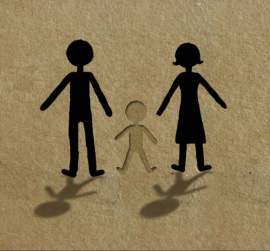
Family Law Overview

Family Forms
Family Court is a type of court that deals with all familial matters, including child support, visitation rights, custodianship, as well as other matters that involve a familial unit as a whole; matters that involve solely parental issues are handled in other types of court, like divorce and alimony.
With the advent of family court, familial units undergoing matters that are emotionally charged in nature, matters where subjectivity and bias might potentially cloud the respective decision making skills of a family member are provided with a theoretically and legally objective, neutral forum in which these matters can be discussed in a rational and productive fashion.
For example, subsequent to a divorce, each individual parent involved might feel that the other was responsible for the termination of the marriage, and furthermore, they may feel as though they deserve sole custody , legal, physical, or both, over the child produced from the marriage. In this event, which usually manifests into a hostile environment, a lack of amicable, respectful discourse is not normally possible, and heightened tempers create stumbling blocks in front of a sound decision.
Upon traversing into the realm of family court, each individual parent is allowed a myriad of options in which to pursue the settlement in question. Should the parents feel as though they can maintain amicable relations, they are offered an opportunity to enter into mediation in lieu of an actual hearing. However, if mediation is not possible, then each individual is given the opportunity to hire their own attorney in order to plead their case in front of a judge in a productive and unemotional manner.
Due to the fact that matters in the home possess such emotional and ardent implications, a forum like family court that promotes stoicism and logic in order to provide optimal care for all parties involved is sometimes a necessity.
Marriage
Civil Rights movement in the United States, both racial, as well as gender roles have become modernized and modified in their representational and legal value. Archaic marriage law is considered to be sexist and misogynistic, rife with discrimination and alienation due to the characteristics and legal descriptions assigned by an archaic female gender role.
Yet, due to gains made in the Civil Rights movement, minorities, a term to which include any individuals who are not Caucasian and male, to varying degrees are afforded equal rights in all forums of legislation. As a result, upon the decision to get married, a couple must establish legal ground rules and stipulations in order to provide for not only a happy and healthy marriage, but also for any contingencies that might arise in the event of its dissolution.
Terms like alimony and prenuptial agreement have become commonplace in the inception of many marriages. Many might argue that legal documents might detract from a perceived purity of marriage, yet the argument can made that every individual has the right to make certain that they are protected, along with their respective assets, in the event of a tragedy or trauma.
Prior to the establishment of equal rights for all American citizens in the Civil Rights Act of 1964, many aspects and instances that took place in this country were viewed through a patricentric lens, forcing women entering a marriage to be susceptible to the whim of the husband.
Divorce
court hearing in which individuals may be invested personally, individuals engaging in divorce hearings are more often than not emotionally invested, allowing for subjectivity, bias, and personal sentiment to enter, invariably skewing logic and rationale.
Despite any overarching emotional feelings, personal vendettas, or statements of passion, a court hearing aims to provide a stoic, neutral forum in which the full extent of rights are to be granted to any individual that participates in a court hearing.
However, as with any situation that retains such emotional volatility, it is important to quell any hostile and unproductive sentiment from tainting the impartiality of a court hearing.
In order to do so, the individuals involved are urged to choose an attorney of their liking to represent them; the ideal attorney is empathic and understanding to the needs of their client, knowledgeable and learned in all legal matters of which their area of expertise is comprised, and determined, and dedicated, to have the best interest of their respective client in mind at all times.
By hiring representation, sentiments and opinions can be expressed devoid of subjective and emotional bias. The return of property and assets need be considered priority, if not the rights of a citizen. In addition, if that marriage has produced a child, considerations must be made for the well-being of the child in question.
Children
The best interest of children, or minors, is the prime concern. Due to their respective younger ages, a factor that brings with it an innate not-fully-developed sense of understanding, perception, and overarching maturity, their welfare and well-being must be a priority in an process in which they are directly involved.
Children cannot and should not be held to the same emotional standards of their adult counterparts; they need to be afforded leniency, compassion, and understanding. Furthermore, in a majority of legal situations in which children are involved, be it divorce or adoption, their role is that of circumstance; they neither chose nor caused the events of any given situation.
In the event that two parents wish to terminate their marriage, the collective stance that they must take is one that focuses on the best interest of their child or children.
Oftentimes, children will blame themselves for their parents’ divorce by means of internalization and obsession. The respective parents need to be cognizant of potential sensitivity and affectation on the part of their child, and behave accordingly; hostile relationships and emotional tumult are simply unproductive in the assistance of a child maintaining a semblance of normalcy.
As a result, different custodial options have been instituted that provide sole or joint custody to one or both of the parents, ideally allowing the child an emotionally-healthy life in which they may maintain a productive and wholesome relationship with their respective parents, or in the case of prior abuse, a removal of the presence of a parent who may be a cause of further abuse, trauma, or pain on behalf of the child in question.
In the event of adoption, gubernatorial agencies and organizations have taken great precautions with the hopes of providing a mutually beneficial situation for both adoptive parents and the children whom they have chosen to adopt.
A lengthy and severe screening process has been establish in order to ascertain that the new adoptive family are comprised of generous and stable individuals who will be able to provide a loving and emotionally-prosperous environment for the child in question.
Adoption
Adoption is one that is inherently mutually beneficial in nature; it allows for both parents, as well as children who are longing to be united in hopes of the creation of an ad hoc familial unit. On one hand, parents who suffer from infertility are relieved of their respective stress and despair by being granted the opportunity to raise a child, despite their biological circumstances.
On the other hand, a child born into impoverishment or an abusive situation is allowed the opportunity to enjoy a healthy, accommodating, and meaningful home life that can provide a groundwork for a successful future. In these terms, adoption is a truly a gift to both parties. Yet, as in any legal process, complications exist.
Although many of the families or single parents wishing to adopt have the most benevolent and pure intentions, there exist others who do not share in those beliefs. In some cases, abused children have simply been adopted into other abusive environments, proving to be devastating for the mental and emotional state of the child in question.
As a result, an intense screening and qualification has been established by child-advocate welfare agencies in order to solidify that the adoptive parents are of virtuous and decent moral fiber. Furthermore, a system of check-ups and follow-ups have been instated, ensuring that the child in question continues to receive the humane, loving treatment to which they are entitled.
Yet, certain LGBT couples and individuals, regardless of their inherent benevolence and kind hearted nature, have been brought into question as far as their ability to raise a child in a healthy environment - thus, adding to further complications in the adoption process.
Furthermore, the respective ethnicity and race of both children, as well as adoptive parents has been brought into question. The process of adoption is a complex one, and as a result, a majority of people question the penalization of LGBT and interracial adoption as a crime against both the parents, as well as the children themselves.



















